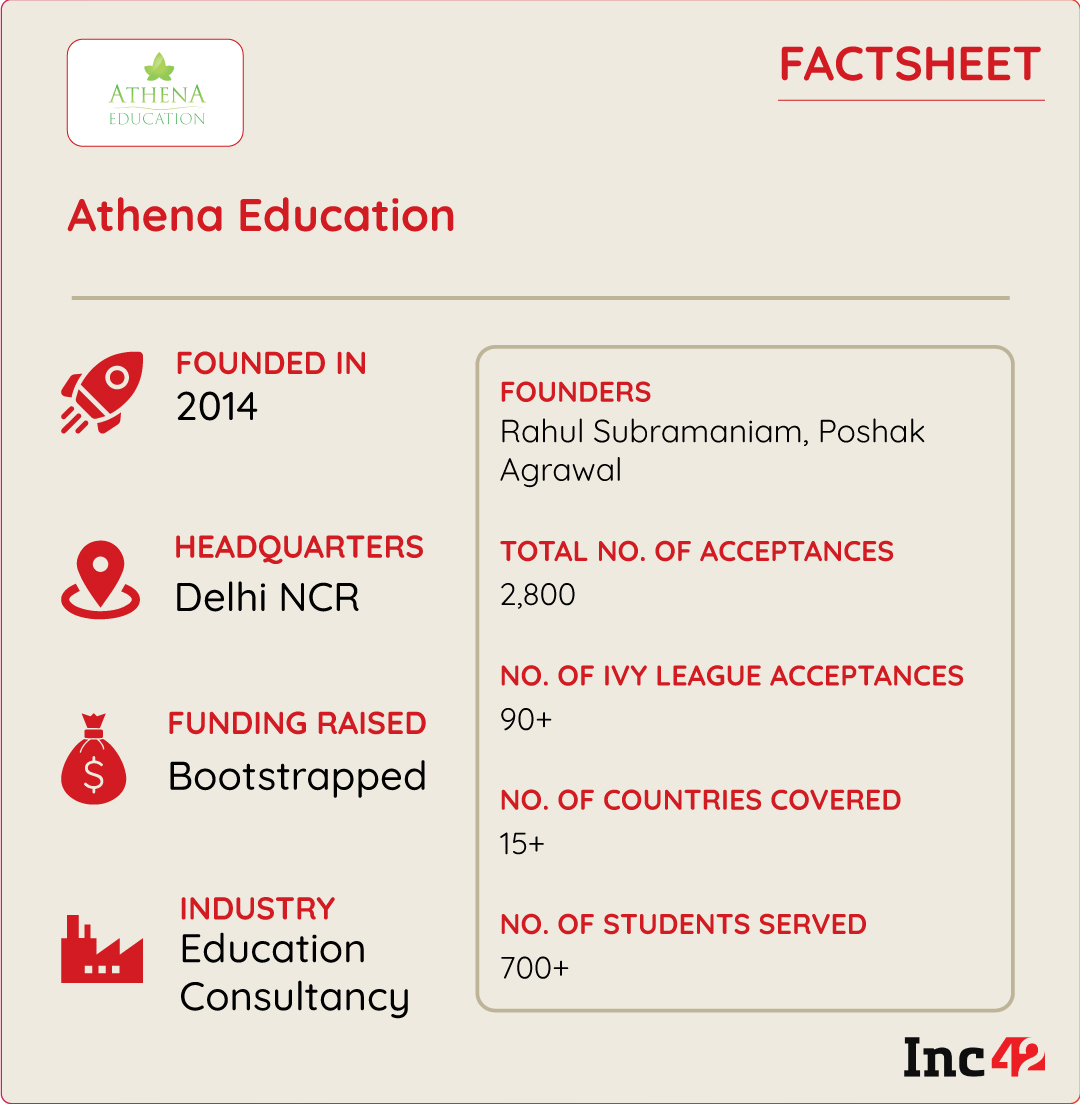Startup Stories
How Athena Education’s Three Pillars Of Training Prepare Ivy League Aspirants As Overseas Admission Gets Tougher

As the world has become an interconnected global village, it not only poses fewer barriers to trade and commerce but also drives the free flow of culture and education. But there is a catch. Although technology has become ubiquitous in new-millennium learning and students can access a few courses online, higher education from premier institutions has yet to witness the much-desired blurring of borders. In-person classroom learning is still the best option for aspiring youth keen to pursue the global curricula of their choice from world-class foreign universities.
Closer home, India has seen a record number of students heading out to study abroad. According to government data, more than 13 Lakh students were studying in 79 countries in 2022, and the number will likely reach 18 Lakh by 2024, per a Redseer report. Although most global universities spend a sizable sum to attract international students, the US remains the most preferred destination for Indians, and the country hosted more than 4.65 Lakh students in 2022.
According to industry experts, the attraction of the elite Ivy League, along with economic and societal factors (career growth, better pay, quality of life), initially triggered the exodus. Currently, India is the second-largest sending country to the US after China, underscoring the young people’s intent to grow globally. However, making the cut becomes increasingly difficult due to a competitive and complex selection procedure.
This is where Athena Education comes in with its holistic solutions, preparing applicants for admission to top university programmes while helping them stay aligned with their passion and educational interests. The aim is to ensure that all their goals and aspirations reach a culmination through these courses and the promise that these students bring is fully realised in the long run. This is an innovative approach, unlike many overseas admission consultancies that rarely explore students’ interests or activities to understand their life’s purpose.
The decade-old consultancy was set up by Princeton University graduates Rahul Subramaniam and Poshak Agrawal. It claims to have trained and mentored more than 800 Indian students, helping them get into their preferred universities across 15 countries. Students also get help with academic scores and English proficiency, which is needed for writing killer essays and compelling letters of intent. In 2022, as many as 68 Athena Education students were accepted by Ivy League schools, while 30 were admitted to MIT, Stanford University, Caltech and 20 other universities in 2023.

A Leap Of Necessity From Offline To Online
Upon their return to India, the founders began to mentor the children of their friends and relatives for overseas admissions. At first, it was done informally, but the duo soon noticed that the country’s startup ecosystem was picking up the pace. They swiftly transitioned their offerings to a structured business and Athena Education was born.
The onset of Covid-19 in 2020 put international admissions into turmoil as borders closed and lockdowns were extended to cope with multiple pandemic waves. Undeterred by the massive disruption, Athena Education shifted to the online mode and focussed on building student profiles and their applications to stay prepared for the future.
Once the offline mode started picking up, the startup invested extensively in state-of-the-art facilities, including an in-house robotics laboratory, a design studio and a recording studio to provide students with hands-on learning experiences.
Recalling the chaos, Subramaniam said the real challenge lay in helping students transition from offline to online learning as the seismic shift psychologically impacted them. To address this, Athena Education created engaging online modules and tailored its coaching style to service individual requirements.
In addition, it started a YouTube video series titled Your Friendly Neighborhood College Counselor in 2023 to explain the intricacies of college admissions to its target audience. Clearly, the online reachout has worked well as the student community has grown 2.5x and the team strength has gone up 5x to manage the growth.
A Deep Dive Into Athena Education’s Training Modules & Core Philosophy
Talking to Inc42, Subramaniam detailed the eligibility criteria to qualify for an Athena programme, the screening tests post onboarding and the mentor-driven preparation procedure.
To begin with, students approaching Athena Education must secure a minimum of an aggregate 80% of all subjects and qualify in the interview conducted by Team Athena to gauge their potential.
During the orientation week, selected students have to write two psychometric tests. One has been designed to gauge their interests, strengths and goals, while the other delves deep into one’s life experiences to understand what has shaped the personality.
Subramanium emphasises that these assessments leverage the Japanese philosophy of ikigai (raison d’être or life purpose). Mentors hold one-on-one sessions with students to find their ‘purpose’ that will be nurtured throughout their journey and included in their curricula.
These mentors at Athena Education are individual subject matter experts to work with based on their subject interest. “For example, a CS student would work with our senior technology and data science mentors, while an economics student would work with an economics researcher and expert.” said Subramaniam.
A customised curriculum is thus developed based on the test outcomes that combine aptitude, interests, earning potential and societal value creation. Mentor-matching is also done, keeping these factors in mind. Each student is assigned a mentor for the rest of the journey until applications are sent to universities.
Mentors play a crucial role at Athena Education as they create ‘student brands’ (read profiles), help them execute capstone projects and keep track of their weekly progress. They also supervise SAT preparations, writing skill development and composition of college essays. For context, a capstone project demonstrates how well a student can put subject expertise to practical use, underscoring the person’s involvement and adding value to the profile.
According to Subramaniam, academics are a foot in the door for Ivy League aspirants. What differentiates the crème de la crème is the social impact they create outside of school education. Based on Athena’s interdisciplinary courses (say, a combination of liberal arts and STEM subjects) and experiential learning, the capstone projects done by its students can create that kind of real-world impact.
Athena Education’s founder shared how a capstone project achieved this goal. A student at Athena Education was passionate about music and had an academic interest in mental health (he had studied psychology in school), but lacked coding skills. So, the mentors from Athena Education’s Knowledge Center trained him and the student came up with an app that recommends therapeutic music to lift the mood of individuals suffering from mental health issues. Subramaniam claims that a Gurugram-based hospital is now using the app.
Admission Consultancy Is Booming, But Here’s The Caveat
While the Ivy League and other premier universities will always be the first preference, the competition gets more challenging every day. For instance, Cornell University (ranked 13th on the QS World University Rankings 2024) has an acceptance rate of around 9%, the highest among Ivy League schools. Moreover, non-STEM students find fewer job opportunities in a slowing market, while those pursuing STEM programmes also face a tough environment as tech companies have resorted to mass layoffs due to macroeconomic headwinds.
But pitted against these realities is the prestige associated with foreign degrees (regardless of the education quality) and the lure of working and settling abroad.
According to recent industry reports, India has seen a 35% YoY jump in students admitted to US universities. More interestingly, American institutions also prioritise Indian students for undergraduate and graduate recruitment (70% and 80%, respectively) per the Fall 2023 Snapshot survey for the academic year 2023-24. Therefore, it is not surprising that more Indians, especially aspiring youth from Tier II and III locations, will be flocking overseas to study in not-so-premier institutions.
This may result in an immediate boom for edtech startups (both marketplaces and pure-play entities) like Leverage Edu, iSchool Connect, AdmitKard, Admission Overseas and Athena, and the Indian market will only keep growing. A study by HolonIQ further predicts that the international education market is set to reach $433 Bn by 2030, while 70% of the global demand is in Asia and Africa. This is expected to grow exponentially and admission consultancy players will grow in sync.
However, growth will depend on various factors such as the quality of solutions, worldwide reach and success rates across elite institutions like Ivy League schools. Too much focus on Tier II and III universities may backfire as candidates soon realise that those degrees will not fetch a significant premium in the job market despite the high cost of overseas education.
Technology, too, will play a pivotal role as many players are rapidly adopting cutting-edge SaaS solutions and emerging tech like generative AI to increase their efficiency. Although tech adoption across education businesses empowers all stakeholders and ushers in a seamless knowledge flow, a holistic approach involving diverse interdisciplinary learning, personalised training and focus on achieving social good through education may help students power ahead.
As the Harvard guidelines say: Our Admissions Office chooses carefully from a broad range of applicants who seem to us to offer the most promise for future contributions to society. Not all of the students who are best prepared for college will be among those with the most future promise, nor are all of the most promising well prepared academically.
Startup Stories
Byju’s partially pays March salaries, pending February payouts.

Byju’s, a prominent player in the edtech industry, has encountered financial challenges resulting in delayed salary payments for its employees. As of April 20, the company has only disbursed a portion of March salaries, attributing the delay to a severe cash crunch. Despite earlier assurances from the company’s management that salaries for March would be paid by April 18, many mid-senior employees have reported receiving only 50% of their March salaries. Additionally, February salaries remain unpaid for a significant number of employees, further exacerbating the situation.
Founder and CEO, Byju Raveendran, has resorted to raising personal debt against his stakes in the company to facilitate salary payments. This underscores the severity of the financial challenges facing Byju’s and highlights the lengths to which Raveendran is willing to go to address the issue.
Employee testimonies reveal the extent of the salary delays, with one employee stating that they received only 50% of their March salary on April 20, with 80% of their February salary still pending. Another concerning aspect is the reported disparity between junior and senior employees, with junior staff receiving full salary payments while top management has gone without salaries for the past two months.
Byju’s has acknowledged the delay in salary payments but has not provided a detailed explanation for the situation. A company spokesperson declined to comment on queries from ET regarding the matter. In an email sent to employees on April 8, the management team expressed regret over the delay and attributed it to the inability to secure approval to access funds from a rights issue. The delay has been further compounded by actions from foreign investors, hindering the company’s access to necessary funds.
This revelation follows a previous report by ET on April 1, which highlighted Byju’s decision to delay salary payments due to constraints imposed by warring investors, limiting the company’s access to funds through a rights issue. The ongoing dispute with investors, including Dutch investor Prosus, has added to Byju’s financial woes and has led to further delays in resolving the issue.
In a separate development, Byju’s India chief executive, Arjun Mohan, announced his departure from the company in mid-April, just six months after assuming the role. This unexpected move prompted founder Byju Raveendran to take on the responsibility of overseeing day-to-day operations of the company’s India business, housed under Think & Learn, marking a significant shift in leadership.
Amidst these challenges, Byju’s is embroiled in a legal battle with a group of investors led by Prosus, who are seeking to block a rights issue and the removal of Byju Raveendran as CEO. The company has also initiated arbitration proceedings to address the dispute and find a resolution.
The rights issue undertaken by Byju’s is significant, as it is being offered at a staggering 99% discount to the company’s peak valuation of $22 billion. This steep discount has implications for investors who choose not to participate in the funding, potentially resulting in a significant dilution of their shareholding post-completion of the rights issue.
The unfolding events at Byju’s underscore the challenges facing the edtech giant as it navigates financial constraints, leadership transitions, and legal disputes. The company’s ability to address these issues effectively will determine its future trajectory and its ability to maintain its position in the competitive edtech landscape.
Startup Stories
Revolut India receives provisional approval for PPI license from RBI

Revolut India, a neobank backed by Tiger Global and Softbank, has secured an in-principle approval from the Reserve Bank of India (RBI) for issuing Prepaid Payment Instruments (PPI), encompassing prepaid cards and wallets. CEO Paroma Chatterjee shared this development in a LinkedIn post on Friday. This approval complements Revolut India’s existing licenses from the RBI, which allow it to function as a Category-II Authorised Money Exchange Dealer (AD II), enabling the issuance of multi-currency forex cards and cross-border remittance services.
Chatterjee emphasized the significance of this milestone, highlighting the opportunity it presents to provide Indian consumers with both international and domestic payment solutions on a unified platform. Revolut, Europe’s largest neobank, entered the Indian market in 2021 with aspirations to disrupt the domestic payments sector. The RBI’s approval is expected to bolster Revolut’s position as a key player in this domain.
Prepaid Payment Instruments (PPIs) are payment tools that utilize stored monetary value, including digital wallets, smart cards, or vouchers, for transactions. RBI Governor Shaktikanta Das proposed on April 5, 2024, to allow PPIs to be linked through third-party UPI applications, enabling PPI holders to conduct UPI payments akin to bank account holders.
Chatterjee underscored Revolut’s commitment to full compliance with regulatory requirements, particularly in India, where the neobank has undertaken significant efforts to localize its global tech-stack to adhere to local regulations.
In an interview with ET BFSI, Chatterjee disclosed Revolut’s plans to introduce a comprehensive suite of digital-first money management services for all Indian customers. These services will enable users to manage their finances, including payments and remittances, both domestically and internationally.
The app, currently in use by employees, will be officially launched once the internal testing phase is completed, according to Chatterjee. She also revealed that there are over 175,000 prospective customers on Revolut India’s waitlist, indicating strong interest in the product.
Startup Stories
Postman buys Orbit to extend developer community reach.

Postman, renowned as an API management platform tailored for enterprises, has recently made headlines with its acquisition of Orbit, a pivotal tool in the arsenal of developer companies for nurturing communities across a spectrum of platforms, including Discord, Slack, and GitHub. Although the specifics of the financial transaction remain undisclosed, Postman took to its blog to underline Orbit’s indispensable role in supporting major developer companies in fostering community management and fostering growth over the course of the past four years.
Within the ecosystem of Postman, the integration of Orbit is poised to be transformative, with the Orbit team set to assume a pivotal role in seamlessly embedding community-centric features into the fabric of the Postman Public API Network. This strategic move is aimed at catalyzing dynamic collaboration between content creators and end-users within the network. Postman, boasting a staggering valuation of $5.6 billion, stands as a stalwart in the realm of API collaboration platforms, serving a user base exceeding 30 million developers and 500,000 organizations.
Under the stewardship of Noah Schwartz, a recent addition to the Postman team hailing from Amazon Web Services, the Orbit team is primed to spearhead initiatives aimed at empowering API distributors to broaden the horizons of their communities, optimize API utilization, and solicit direct feedback from users entrenched within the network.
This integration is anticipated to embolden developers to unearth APIs tailored to their unique requirements and foster meaningful engagements with peers to extract maximum value from each API. However, as part of the transitionary phase, Orbit has outlined plans to gradually phase out its existing product and platform over the span of the next 90 days. Commencing July 11, all functionalities will be deactivated, with no provision for the creation of new users or workspaces.
Postman’s strategic maneuver comes on the heels of its triumphant fundraising endeavor in 2021, securing a whopping $225 million in funding. The fundraising round, spearheaded by Insight Partners, witnessed active participation from prominent entities such as Coatue, Bond Capital (helmed by Mary Meeker), and Battery Ventures.
-

 Startup Stories1 year ago
Startup Stories1 year agoWhy Millennials, GenZs Are Riding The Investment Tech Wave In India
-

 Startup Stories1 year ago
Startup Stories1 year agoStartups That Caught Our Eyes In September 2023
-

 Startup Stories1 year ago
Startup Stories1 year agoHow Raaho Is Using Tech To Transform India’s Fragmented Commercial Trucking
-

 Startup Stories1 year ago
Startup Stories1 year agoMeet The 10 Indian Startup Gems In The Indian Jewellery Industry’s Crown
-

 Crptocurrency10 months ago
Crptocurrency10 months agoLither is Making Crypto Safe, Fun, and Profitable for Everyone!
-

 Startup Stories1 year ago
Startup Stories1 year agoWOW Skin Science’s Blueprint For Breaking Through In The $783 Bn BPC Segment
-

 Startup Stories1 year ago
Startup Stories1 year agoHow Volt Money Is Unlocking The Value Of Mutual Funds With Secured Lending
-

 E-commerce1 year ago
E-commerce1 year agoTop Online Couponing Trends To Watch Out For In 2016




